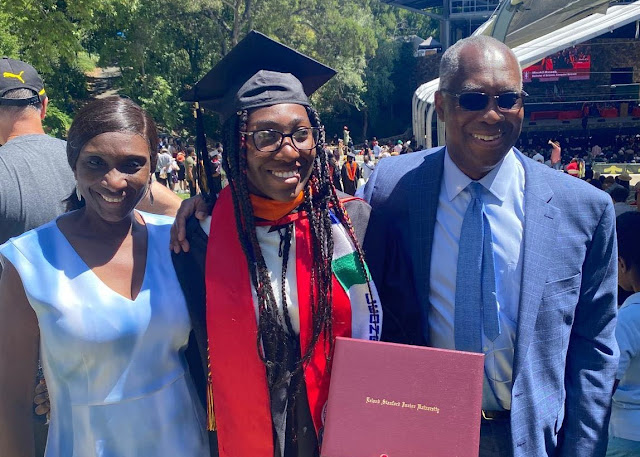VitabuBooks Review
I think AllGov.com had one of the best headlines for the news of the day: A New Nation is Born: What is South Sudan? AllGov dot com, which provides up-to-date news about more than 300 branches of the United States government, had a good primer on the new East African nation and led its July 9 entry with a cheerleader.
Like Deng, Manute Bol, who died a year ago this June, returned to his homeland, and he wanted to do everything he could to see southern Sudan make it through. During a fundraising drive, Manute said that he spent much of the money he made during his 10-year NBA career (an estimated $3.5 million) supporting various causes related to Sudan. Life after basketball was full of highs and lows.
In 2002, after a political dispute in Sudan, Bol was admitted to the United States as a religious refugee, and resided in West Hartford, Connecticut. In July 2004, Manute broke his neck when he was ejected from the taxi he was riding in hit a guardrail and overturned.
After he recovered from his injuries, Bol, moved to Olathe, Kansas. He also took up his fundraising activities. In April 2006, he supported the Sudan Freedom Walk, a three-week march from the United Nations building in New York to the capitol in Washington, D.C. The event was organized by Simon Deng, a former Sudanese swimming champion, and a longtime friend of Bol. Deng, who was a slave for three years from the age of nine, intended for his Sudan Freedom Walk to be aimed at finding a solution to the genocide in Darfur (western Sudan). It was also meant to raise awareness of modern day slavery and human rights abuses throughout Sudan.
On June 19, 2010, Bol died at the age of 48 from acute kidney failure and complications from Stevens–Johnson syndrome at the University of Virginia Medical Center in Charlottesville, Virginia. After his death, tributes to his basketball career and charitable works came from around the United States and the world. His former teams, Washington Bullets (1985–1988, 1994), the Golden State Warriors (1988–1990, 1994), the Philadelphia 76ers (1990–1993), the Miami Heat (1993–1994) and the NBA, issued statements in recognition of his impact on the sport of basketball and on his native Sudan. In addition, a salute to Bol took place on the floor of the United States Senate just a few days after his death.
Manute: The Center of Two Worlds is one of my favorite sports books. Not because of all the blocks, but because I got to read about the life and times of a new breed African sportsman.
"American sports fans", allgov said, "may recognize the names of professional basketball players Luol Deng and Manute Bol, both of whom were born in what is now South Sudan and starred in the National Basketball Association."
Chicago Bulls star Luol Deng may miss out for Great Britain, according to the BBC, but Deng's role in his new 'old' country is not in doubt.
Like Deng, Manute Bol, who died a year ago this June, returned to his homeland, and he wanted to do everything he could to see southern Sudan make it through. During a fundraising drive, Manute said that he spent much of the money he made during his 10-year NBA career (an estimated $3.5 million) supporting various causes related to Sudan. Life after basketball was full of highs and lows.
In 2002, after a political dispute in Sudan, Bol was admitted to the United States as a religious refugee, and resided in West Hartford, Connecticut. In July 2004, Manute broke his neck when he was ejected from the taxi he was riding in hit a guardrail and overturned.
After he recovered from his injuries, Bol, moved to Olathe, Kansas. He also took up his fundraising activities. In April 2006, he supported the Sudan Freedom Walk, a three-week march from the United Nations building in New York to the capitol in Washington, D.C. The event was organized by Simon Deng, a former Sudanese swimming champion, and a longtime friend of Bol. Deng, who was a slave for three years from the age of nine, intended for his Sudan Freedom Walk to be aimed at finding a solution to the genocide in Darfur (western Sudan). It was also meant to raise awareness of modern day slavery and human rights abuses throughout Sudan.
On June 19, 2010, Bol died at the age of 48 from acute kidney failure and complications from Stevens–Johnson syndrome at the University of Virginia Medical Center in Charlottesville, Virginia. After his death, tributes to his basketball career and charitable works came from around the United States and the world. His former teams, Washington Bullets (1985–1988, 1994), the Golden State Warriors (1988–1990, 1994), the Philadelphia 76ers (1990–1993), the Miami Heat (1993–1994) and the NBA, issued statements in recognition of his impact on the sport of basketball and on his native Sudan. In addition, a salute to Bol took place on the floor of the United States Senate just a few days after his death.
Manute: The Center of Two Worlds is one of my favorite sports books. Not because of all the blocks, but because I got to read about the life and times of a new breed African sportsman.



Comments
Post a Comment